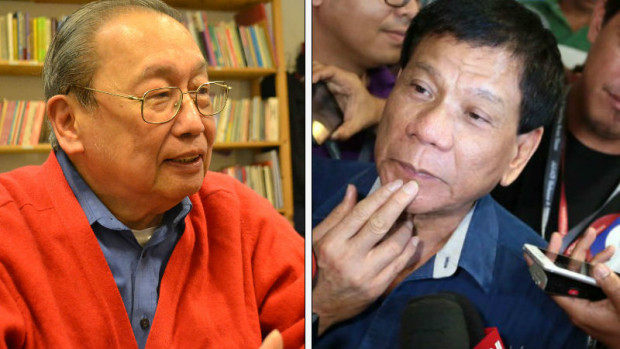Joma Sison reaches out to Duterte: Let’s continue peace talks

Communist Party of the Philippines (CPP) founder Jose Maria Sison and President Rodrigo Duterte. FILE PHOTOS
DAVAO CITY—Communist Party of the Philippines (CPP) founding chair Jose Maria Sison extended an olive branch to President Rodrigo Duterte and offered a solution to the standoff in the peace negotiations.
Sison, who is now the chief political consultant of the National Democratic Front of the Philippines (NDFP), said in a statement that both parties must not lose sight of the gains of the negotiations and must consciously defend it from spoilers.
He noted that there was a “fair exchange of views and agreements on efforts to comply with the Comprehensive Agreement on Respect for Human Rights and International Humanitarian Law (CARHRIHL) concerning the release of all political prisoners, justice for and indemnification of victims of human right violations under the Marcos regime, allegations of human rights violations under Oplans Bayanihan, Tokhang and Kapayapaan.”
During the third round of talks last month, both parties also signed the supplementary guidelines of the Joint Monitoring Committee, which would facilitate the processing of human rights complaints.
Giving clarity to the confusing situation, Sison explained that while the communist movement decided to withdraw its indefinite unilateral ceasefire, both parties are keen on inking a bilateral ceasefire agreement.
READ: Gov’t declares all-out war on Reds
“There was also an initial discussion of the bilateral ceasefire agreement to replace the unilateral ceasefire declarations,” Sison said.
The New People’s Army (NPA) announced on February 2 that its ceasefire is terminated effective February 10 citing the non-release of political prisoners and the alleged continued presence of military forces in the communities as its two major reasons.
Sison added that the biggest achievements in the talks between the NDFP and the Duterte administration were the exchange of complete drafts for the Comprehensive Agreement on Social and Economic Reforms (CASER) and the Comprehensive Agreement on Political and Constitutional Reforms (CAPCR).
These two agreements, if signed and implemented, are expected to address the root causes of the 48-year-old conflict.
Sison optimistically said that the drafts can be unified within this year and reaffirmed the commitment of the NDFP in helping Duterte forge a federal republic.
“I estimate that it is possible to unify these drafts within 2017. The NDFP has formally offered to GRP (government of the Republic of the Philippines) to co-found the Federal Republic of the Philippines on the basis of the CAPCR,” Sison said.
Sison said that the Comprehensive Agreement on End of Hostilities and Disposition of Forces (CAEHDF), the last substantive agenda before the final peace agreement, can be signed in 2020-21.
A bilateral ceasefire can be signed this year especially if CASER and CAPCR will be inked and implemented, Sison said.
“Before then, a bilateral ceasefire agreement is possible, especially after the signing of the CASER and the CAPCR by the negotiating panels in 2017,” Sison expressed.
And with the present exchange of bitter words and the move to suspend the talks, Sison said he understands Duterte’s reaction but he asserted that the talks must be preserved.
READ: NPA rebels launch fresh attacks, condemn Duterte for ending talks
“I can understand the role of President Duterte in reacting as GRP president and Commander-in-Chief. It is his duty to speak and act in the interest of the GRP and express concern for his troops. But there should have been a measure of restraint in his reaction in order to preserve the GRP-NDFP peace process,” Sison said.
He added that while he understands Duterte, his reactions “should not have gone this far.”
READ: With hunt for rebel leaders underway, Duterte urged to be more patient
To move the process forward, Sison suggested that the government consult its own peace panel and to provide a space for back channeling to resolve the present issues.
“I propose to him to consult thoroughly with his negotiating panel and the peace advocates in his own cabinet and others outside of his government, and encourage and allow back-channeling efforts to clarify misunderstandings and solve immediately the current problems,” Sison said.
“The third party facilitator deserves a briefing from each negotiating party and may also help to enable the continuance of the peace process,” he added.
Sison said that the recent incidents should be a reminder to both sides on the importance of pursuing and forging the needed agreements.
“Even if the armed conflict between the armed forces of the two parties has resumed, peace negotiations can and must continue precisely to continue with the forging of the CASER, CAPCR and the bilateral ceasefire agreement and effecting the amnesty and release of all political prisoners within 2017,” Sison said.
He noted that at least 10 major agreements were made during the administration of former President Fidel Ramos even if fightings were happening on the ground.
“The CPP, NPA and NDFP remain committed to the peace process in accordance with The Hague Joint Declaration and further agreements. They wish to pursue with the GRP the bright prospects that started with the first round of formal talks in August 2016 and overcome the peace spoilers that run counter to the progress that has been achieved in the third round of formal talks,” Sison said.